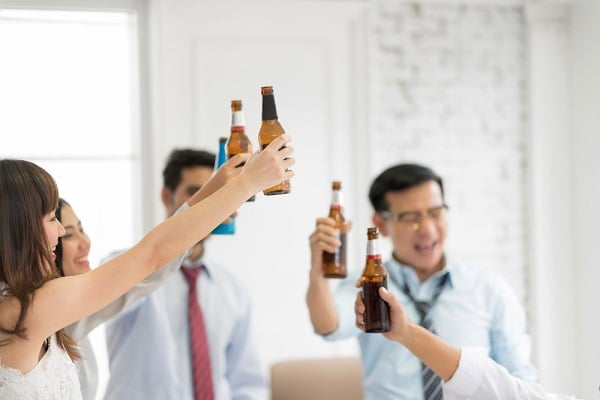 Overall, alcohol still has a place in the work world – and many people think it's just fine. (Photo: Shutterstock)
Overall, alcohol still has a place in the work world – and many people think it's just fine. (Photo: Shutterstock)
Many employers don't mind if their workers booze it up together at holiday parties and other “bonding events” – and some still encourage deals with clients sealed with a martini at lunch, according to the report, “Drinking in the workplace,” by Niznik Behavioral Health.
Niznik surveyed 1,010 people and found that the most common ways that companies allow alcohol include hosting holiday parties where alcohol is served, 45 percent; hosting team bonding events where alcohol is served, 24.2 percent; allowing alcohol to be consumed during meetings/lunches with clients/customers, 13.4 percent; sponsoring happy hours, 12 percent; and allowing employees to drink on certain days/hours, 12 percent.
“Holiday parties represented the most common form of sanctioned drinking – though companies are increasingly reconsidering the presence of alcohol at these events in light of concerns about sexual misconduct,” the authors write.
Related: Alcohol at work can turn off prospective employees
The top five industries allowing or sponsoring alcohol consumption are technology; construction; marketing and advertising; arts, entertainment and recreation; and information services and data processing.
“Employees of tech companies were most likely to report that their employers permitted or sponsored alcohol consumption overall,” the authors write. “This finding resonates with recent headlines emerging from Silicon Valley: Companies like Twitter and Glassdoor offer free beer at all hours, while other tech giants have moved to curb partying by changing previously lax policies.”
While 78 percent of respondents say drinking with general co-workers was acceptable, just 60 percent view supervisors as suitable drinking partners. But for those who do, 24 percent say drinking with a superior could lead to better job opportunities.
“No matter your drinking partner's job title, however, moderation is in order: With any kind of co-worker, our respondents felt two drinks was the appropriate amount of alcohol to consume,” the authors write. “In a similar vein, beer and wine were seen as the most acceptable drinks to have alongside colleagues, whereas most respondents felt that various kinds of hard liquor were not a good idea in such scenarios.”
While many companies may sanction alcohol, a third of respondents prefer not to drink, according to the survey. Twenty-two percent make excuses to get out of their obligation to attend and 14 percent simply avoid going – but for those who attend events, 12 percent pretend to drink.
The authors note that it's a good best practice to keep non-alcoholic beverages on hand and is a particularly smart choice if any employees are recovering alcoholics. “Well-intentioned colleagues are less likely to repeatedly offer you drinks if you have one already, and they probably won't inquire if your cup contains alcohol,” the authors note.
Overall, alcohol still has a place in the work world – and many people think it's just fine, according to the survey.
“Truly bonding with one's colleagues means respectfully considering their needs and accommodating a range of preferences,” the authors write. “If your company provides alcohol at its events, it's important to convey that drinking isn't compulsory. Moreover, moderation must be clearly encouraged, so that everyone can enjoy safety and comfort.”
Read more:
© Touchpoint Markets, All Rights Reserved. Request academic re-use from www.copyright.com. All other uses, submit a request to [email protected]. For more inforrmation visit Asset & Logo Licensing.







